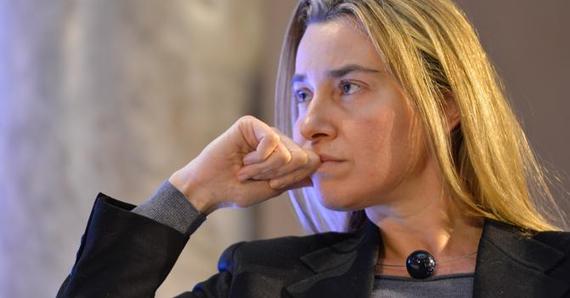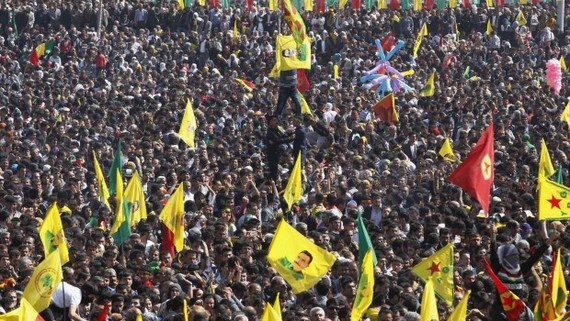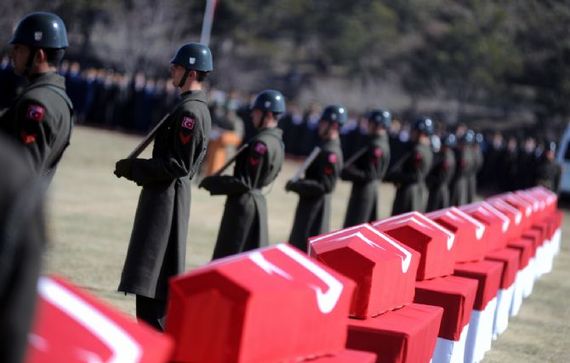All the signs are, Turkey's bleeding, unresolved Kurdish issue this time comes to a boiling point.
Current emergency rule, put into effect July 21 -- a week after the bloody coup attempt - had already from day one raised the concern that the 'decree regime' it in practice means would especially raise the pressure on the elected pro-Kurdish party, HDP, and the vast electorate in southeastern provinces of Turkey, which stands behind the political movement largely connected to the PKK and its various branches.
The concern has been voiced in the European Parliament most recently. At a special session in EP General Assembly, both EU's 'foreign secretary', Federica Mogherini, and EP's Rapporteur on Turkey, Kati Piri, underlined the importance of the AKP government returning to peace negotiations with the Kurdish Political Movement, represented -- they implied -- by the politically legitimate HDP. Mogherini mentioned 'a respectable process', while Piri said that it is very difficult to understand the linkage between the coup attempt and the municipalities ran by the HDP, which have been recently taken over by the government appointed trustees.'
The point raised by Piri is the one that brings things to a boiling point.
In a most recent decree, accompanied by the loud approval of President Erdoğan, the AKP government ordered seizure of 28 municipalities in the mainly Kurdish provinces, out of which 24 are under the control of the HDP. This has raised the Kurdish rage even higher, causing protests and some violence.
Meanwhile, PKK's jailed leader Abdullah Öcalan was allowed to visit -- the first one after almost two years - by a relative, and his message was short. 'What goes on is an endless war, with no winners' he told his visiting brother. 'It was not us who ended the (peace) process. If the (Turkish) state is ready, we can solve this issue in six months.'
While it had some limited calming effect over the Kurds, the brief message has so far not echoed positively at all in government circles. On the contrary, statements by Erdoğan and other top figures point to a resolve on escalating the war. Erdoğan said that the seizure of municipalities was a measure delayed. Prime Minister Binali Yıldırım implied most recently that even other HDP municipalities would be run by appointed trustees, signalling a stronger showdown. Another top figure of the AKP, Bülent Turan went even further, saying that 'the very HDP party must be taken over by a trustee'.
HDP is equally resolved, with its top leaders reacting that all those measures will be met by fierce resistance.
Against the backdrop of deep tension, there are even more signs of severe showdown. A columnist who is known to have top level sources within the AKP, Abdülkadir Selvi, wrote a few days ago that along with the take over of the municipalities, there are now preparations to arrest some HDP deputies, whose parliamentary immunity has already been lifted. There are already eight of them subpoenad, and the leader of the HDP, Selahattin Demirtaş, stands next to be called to interrogation. HDP stated repeatedly that it will disobey the subpoenas. 'Let the police come and take us by force' was the message.
If or when these scenes are staged, we will have come closer to a boiling point, it seems.
To put in to rights context of what Ankara aims to do, the phrase uttered last week by Prime Minister Yıldırım is very helpful. 'There will be no more solution process' he said, fending off the calls from various direction for a return to the peace table. Further, he also mentioned that the government is changing tactics in the anti-insurgency, and it will be far more offensive in its approach to the PKK.
There is, then, a clear picture, when bits and pieces put together, of a more intense warfare, possibly inviting more civilian suffering and spill-over of terror into urban areas.
The new scheme is elaborated on in an analysis by Metin Gürcan, who has a military background. ' This time, it (Turkish state) plans to totally wipe out the PKK and all its auxiliaries' wrote Gurcan. 'With the current state of emergency -- which does not require legislative oversight -- Ankara feels it can end the deadlock and totally eliminate the PKK.'
Here are some excerpts of what the 'finishing off PKK' plan, according to the analysis by Gürcan:
- The military strategy in the rural areas will no longer be based on static, permanent outposts, but will employ mobile offensive units. Ankara relies heavily on advanced military technology of target acquisition and precise hits. Officials are determined to pursue this concept with uninterrupted tempo in all weather conditions.
- Another feature of the combat in rural terrain is the government-sponsored village guards, made up of pro-government, armed Kurds who know the terrain well. With a recently issued decree under the state of emergency, the village guards -- now about 90,000 strong -- will be deployed not only in their home provinces but all over the southeast.
- Ankara plans to install in cities a "neighborhood guard" system, similar to village guards, by arming pro-state Kurdish youth in neighborhoods of critical towns. But armed strife has already begun between neighborhood guards and PKK urban militants.
- Urban terrain security will be based on police and gendarmerie special operations teams. Ankara, aware that the destruction inflicted in towns by military forces had tarnished Turkey's international reputation, now wants to handle security in towns by putting up permanent outposts in critical entry-exit points and by increasing the number of police and gendarmerie special operation teams. New Minister of Interior Suleyman Soylu said 10,000 new people will be recruited and given crash courses in police special operations.
- With another state of emergency decree, new police personnel can be recruited solely by oral interviews instead of going through the cumbersome central public service examination process. This means those with basic qualifications will be recruited to serve in police special operation teams after a simple interview and seven months of condensed training.
- The intention is to mobilize the security forces both in urban and rural terrains to exert round-the-clock pressure on the PKK and immobilize it.
- The moves in the political arena will start with national measures. Legal proceedings have been initiated against the pro-Kurdish Peoples' Democratic Party (HDP) deputies and officials whose direct links with the PKK have been proved.
- Regionally, Ankara aims to isolate the PKK by strengthening ties with the Kurdish Regional Government in northern Iraq, cooperating more closely with Iran on border security and undermining the Kurdish nationalist Democratic Union Party domination of northern Syria.
Most important to note is that the PKK is patient' concludes Gürcan, approaching the core issue.
''It knows it is running a marathon, while Ankara sees the struggle as a 100-meter dash. Then we have to ask: How long can Ankara sustain these extraordinary measures, and can the PKK really be eradicated?''
Having observed the bloody insurgency over three decades ever from its start, I have an easy answer.
It seems that Erdoğan, after having forged a new alliance with all the hardliners in Ankara, possibly also having opened the path again for the dirty warriors that caused havoc during the 1990's, is persuaded that the format of the Sri Lankan government finishing off Tamil guerillas stands as perfect template for Turkey as well.
Given the differences -- for example the Kurdish aspirations for self-rule now becoming a regional phenomenon -- it is now raising the hand in a bloody gamble, which may be much more costly on all aspects than ever before. Or, as some cynics would say, 'It is like using the same tool over and over and expect a different result, which describes the folly.'



